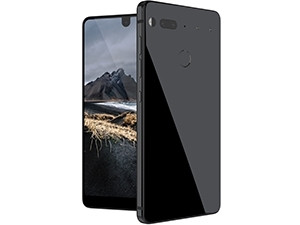
There is no shortage of phone brands. The problem is not quantity, it's breathing room. Once you discount Samsung and Apple, the market literally lives off crumbs.
Some are in the game mainly for brand and cross-divisional pollination. As several commentators wrote on the topic, if LG makes nice screens for its phones, other mobile manufacturers are more likely to consider LG screens for their devices. Companies such as Xiaomi are more interested in selling other products to consumers, using the smartphone as a beachhead for those future sales. Amazon has a similar strategy with the Kindle and hoped to do the same with its now-defunct Fire phone.
But to predominantly sell a phone as a phone (albeit with smart home expansions later down the line) and sell it at a premium: crazy, right? After the iPhone and S family dug up all the veins, that's just fool's gold. It was my first thought when looking at the Essential.
Revealed last month, it's tempting to say the Essential (or more specifically, the Essential PH-1) is a lame duck. It will cost $699, yet does not appear to have anything dramatically different to any other flagship phone. There are some nuances. It has a titanium and ceramic body, and features a modular attachment that may allow for some powerful peripherals. Point in case, it will ship with its own attachable 360 camera.
The reason it made headlines is because Essential is the creation of Andy Rubin, also known for the Sidekick and a little operating system called Android. Rubin himself wrote on the company's blog that the phone came to be after an evening with a friend bellyaching over the state of consumer technology. Device and connector redundancy, bloatware and the ever-increasing focus on creating fiefdoms instead of focusing on the device all motivated his decision.
That and the realisation that he is in part responsible for the current mess. Outside of Steve Jobs, it is hard to point to any single person who has had more to do with the modern smartphone than Rubin. Android is the most successful operating system in history ? even bigger than Windows.
Yet is the Essential about to start a revolution? Were it not for Rubin's name, would the phone even catch our attention? Good question ? and based on the face value of the current phone, the answer is likely 'no'.
But there may be more to this than we can see. Wired has published an excellent look at the phone and company. It reveals a more consistent philosophy that does indeed declare how modern phones are failing us. For example, why are we content with Apple changing its connector standard every few years? And why do we tolerate all the pointless bloatware Samsung throws on its devices?
At face value, the Essential is ludicrous and appears doomed to fail. But look closer and there is a lot to be optimistic about.
Another article, from The Verge, makes the argument that Essential is looking to be a niche premium brand. The ceramic and titanium body, which is impractical to manufacture at large scale, is a clear indication of that. Essential does not plan to make millions and millions of phones at a go ? if anything, it has gone the other way and looked for techniques and materials that do not scale well. That is counter-intuitive, but as the Verge feature notes, the Internet has allowed niche manufacturers to flourish.
In essence, Essential is swimming upstream here. That alone is noteworthy, since practically all other phone brands have done the opposite. I'd also add that Rubin is close to Google and that the Essential PH-1 runs vanilla Android ? clean as driven snow, according to the company. That may ensure this phone is as close to the update cycle as Google's own new Pixel phones. If that kind of thing matters to you (and it does to me, which is why I switched to an iPhone), the Essential looks like a rather sweet deal.

But will it last? I am encouraged that the company's approach is to not ape the scale-up-sell-bulk habits of the market. $699 is a lot of money, but no more than what a Samsung S8 or iPhone 7 will cost you in South Africa. The idea that it is a phone made to last for years, not slave to artificial extinction moves such as changing connectors or stopping software updates, is very appealing.
At face value, the Essential is ludicrous and appears doomed to fail. But look closer and there is a lot to be optimistic about. I've moved from sceptic to hopeful. Now, the Essential's arrival in SA is unlikely at the moment. But perhaps it can start a trend. Not everyone has Android's creator at their helm.
I do have a major gripe: the lack of an audio jack. Aping this stupid design regression from Apple is a bad move. Yes, I can see there is a longer-play in Bluetooth headphones, such as building modern smart speaker systems into them. But I like plugging my cheap desktop speakers into my phone. Hopefully this is a misguided trend that will die soon. You don't need to kill the 3.5 jack in order to promote Bluetooth usage. Also, the Essential PH-1 does not claim to be waterproof, so what's the point? A slightly thinner phone?
This concern aside, the Essential might be able to steer the Android market away from its quagmire of fractured systems and short-lived devices. It may also prove that niche mobile brands are viable, providing they are well made and backed by an appropriate distribution model.
The second coming of Android? That would be fantastic. Let's hope Essential can make it happen, or at least get the ball rolling.
* James Francis is a freelance writer whose work has appeared in several local and international publications.
Share